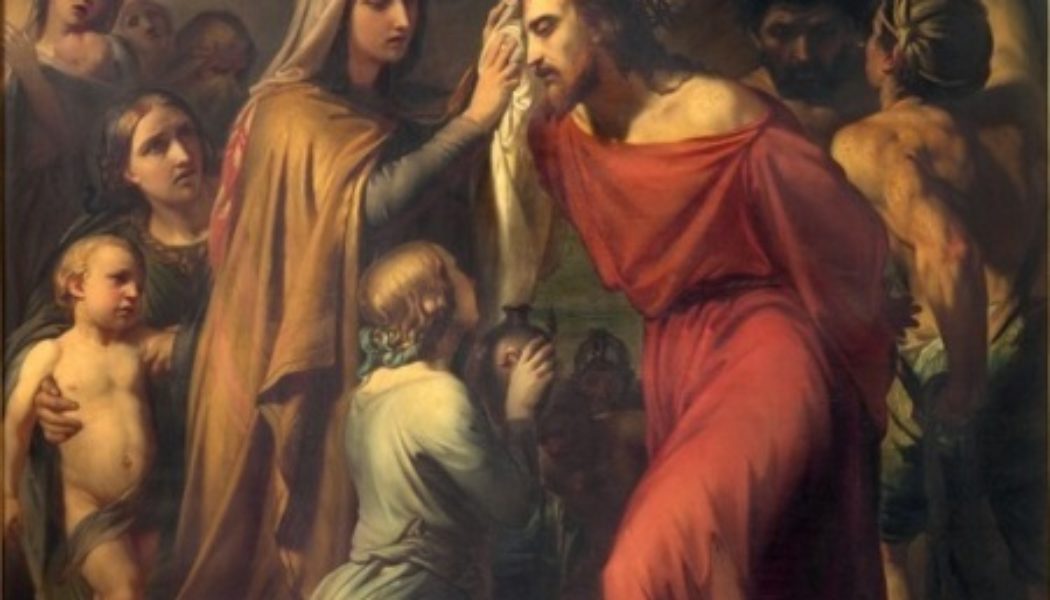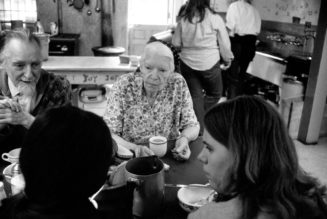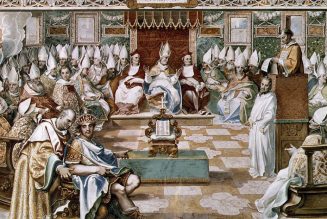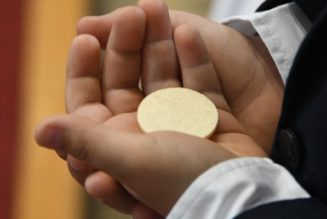By Fr. Victor Feltes
Hopeful for the help of the Holy Spirit, I will share with you meditations about people personally present for Jesus’ Passion. In particular, I will reflect on those persons featured in the Fifth, Sixth, and Eighth Stations of the Cross; Simon of Cyrene, who helped carry Jesus’ Cross; Veronica, who wiped Jesus’ face with her veil; and the women of Jerusalem, who followed and openly wept for Jesus along the Way of the Cross. While considering these reflections, I encourage you to look for two or three golden nuggets that sparkle for you. Tuck them into the pocket of your mind or into your notes and later bring them to prayer for meditation.
Prologue – Pontius Pilate and the Roman Soldiers
Good Friday morning, the hostile crowd cried out for Jesus’ blood. Like Joseph’s brothers in the Old Testament, this crowd intended evil for Jesus, but God intended this for good, in hopes of achieving the salvation of these sinners and the whole world. Governor Pontius Pilate, even after having Jesus gruesomely whipped, was unable to placate the mob. So Pilate washed his hands and sentenced Jesus to death despite admitting that he had committed no crime. Much evil in the world is not only from active hatred like the crowds but from the callous indifference of people like Pilate. “Blessed are those who hunger and thirst for righteous, for they shall be satisfied.”
Then, St. John records in his Gospel, the soldiers “took Jesus, and carrying the Cross himself he went out to what is called the Place of the Skull, in Hebrew, Golgotha.” The Romans would compel men condemned to death to bear the instrument of their own torture, a cross. This was an added psychological punishment and humiliation. It is like having to tie your own noose before they use it to hang you. It is like being forced to dig your own grave before they kill and bury you. It is akin to modern totalitarian states that have executed people by a gunshot to the back of the head and then sent the family a bill for the bullet. The correction and punishment of wrongdoing may be necessary both in nations and in households, but we must never do either without respect for others’ dignity.
Jesus was forced to carry his own Cross, a Cross he carried for us sinners. He carried his Cross towards a place called Golgotha, or Calvary. Golgotha was a rock mound within a limestone quarry alongside a road leading to and from Jerusalem. The Romans chose this execution site a short distance outside one of the city gates for its high-visibility to many passersby. The guards with Jesus had orders to crucify him there along with two other condemned men. But after Jesus’ violent scourging, he was in agony, dehydrated, and physically weakened. He had already fallen down at least once under the Cross’s weight.
Perhaps his guards grew impatient because Jesus was progressing so slowly. The soldiers also may have feared that Jesus would collapse from exhaustion and be unable to be made to stand up and continue. And they might get in big trouble with their superiors if Jesus died on the way to Golgotha without receiving the sentence the governor had decreed. We may feel discouraged by the power of wicked people and groups in our world but I think we underestimate their inherent weaknesses, like those reflected in these Roman soldiers. “The foolishness of God is wiser than human wisdom, and the weakness of God is stronger than human strength.” About three hundred fifty years after the mighty pagan Romans executed Christ and began persecuting his peaceful Church, Christ conquered the Roman Empire; Christianity became its official state religion. “Blessed are the meek, for they will inherit the land.”
The 5th Station – Simon of Cyrene
Saints Matthew, Mark, and Luke all note in their Gospels that the Roman guards found a helper for Jesus. As they were going out, they met a passer-by who was coming in from the country. They took hold of him and pressed him into service to carry his Cross. By law, a Roman soldier could compel a man in a conquered land to carry a load for him for as much as one mile. Daring to refuse would bring on a beating, so this traveler to Jerusalem submitted. Laying the Cross on him, they made him carry it behind Jesus. This man’s name was Simon, a Cyrenian from Cyrene. Cyrene was a region in Northern Africa. It had a Roman colony and a sizable population of Jews.
Perhaps Simon the Cyrene, like so many other Jews, was on pilgrimage to Jerusalem for Passover. But however far his previous journeying had been, that day Simon had a place to be and things to do before the feast. Having to carry the Cross that Friday felt like a major inconvenience for Simon, but it was most likely the greatest thing he ever did. Some of the greatest things you have done in your life were probably unpleasant and inconvenient, too. Mentally, let us reframe the interruptions which arise in our days and in our lives as providential opportunities. This way we can make the most of them and engage them at our best.
One can imagine Simon feeling very reluctant to bear a stranger’s cross. Since Simon was a freeman who had not been found guilty of any crime, he may have viewed this forced servitude to be doubly degrading. Simon may have also dreaded that insults, spitting, dirt, and stones would be hurled at him by ignorant bystanders while he made his way through the streets in the procession of the condemned. Yet, even if unwillingly, Simon picked up the Cross and followed Jesus. Simon did not freely choose this burden but, because of it, Simon was probably physically closer to Jesus for most of the journey to Golgotha than Mother Mary, John the Beloved, or Mary Magdalene. We will not choose many of our life’s burdens, especially our illnesses or personal losses, but these can be God’s providential means to bring us closer to the Lord.
I find it interesting that Simon of Cyrene was chosen to carry Jesus’ Cross on the morning after another Simon, Simon Peter, denied Jesus three times and withdrew for a time out of shame. Perhaps this was just a coincidence, another apostle, Simon the Zealot, shared that name as well. But I wonder if Simon of Cyrene was a fill-in substitute for Peter. If Simon Peter had not denied the Lord, or had returned to him more rapidly, would he have been the one to carry Jesus’ Cross? How beautiful and inspiring would that have been! I do not mention this possibility to encourage you ruminate, to lament the unchangeable past and any good things left unrealized on account of your sins. I mention this so that in a moment of testing you might consider how taking the next good step makes many good paths possible.
God providentially allowed Simon to take part in Jesus’ glorious work for the salvation of the world on Good Friday. The Lord likewise invites you and me to play a role in salvation and entrusts a share in his saving work to us today. St. Pope John Paul the Great noted this in 2001 during his meditation on the Fifth Station of the Cross at the Coliseum in Rome:
“Jesus could bear his Cross alone, did he so will; but he permits Simon to help him, in order to remind us that we must take part in his sufferings, and have a fellowship in his work. His merit is infinite, yet he condescends to let his people add their merit to it. The sanctity of the Blessed Virgin, the blood of the martyrs, the prayers and penances of the saints, the good deeds of all the faithful, take part in that work which, nevertheless, is perfect without them. He saves us by his blood, but it is through and with ourselves that he saves us.”
If Simon did not know or believe in Jesus before, it appears that this experience of carrying his cross helped lead to Simon’s Christian conversion and the conversion of his family as well. Amongst the four Gospels, only St. Mark notes that Simon of Cyrene was “the father of Alexander and Rufus.” Scripture scholars believe that the names of Simon’s sons were mentioned here because the first audience Mark’s Gospel was written for knew who Alexander and Rufus were. Church tradition reports that St. Mark the Gospel writer was the scribe for St. Peter the Apostle, the first bishop of Rome. And St. Paul in his Letter to the Romans writes, “Greet Rufus, chosen in the Lord, and his mother, who has been a mother to me, too.” Simon’s endurance through a trial with Christ grew his faith in Christ. Simon shared this testimony with his family. And by his faithful example, they became faithful Christians too. Your non-practicing children already know that you believe, but have they heard you say why you believe and the difference that religious faith has made in your life? Be sure to tell them.
The 6th Station – Veronica
The Sixth Station of the Cross recounts an event unrecorded in the Gospels. Despite the crowd and the soldiers, a woman approaches Jesus. His face is covered with blood, sweat, dust, and spit. Moved with compassion, she removes the veil covering her head, and offers it for Jesus to wipe his face. We know this woman as St. Veronica. The Western Church calls her Veronica, while the Eastern Church calls her Berenike. Providence may have arranged that this reflects her proper name, but it seems more likely that we know her by a title which the Church has given her. We see this with other people at the Passion. The name of St. Longinus, the soldier who pierced Jesus’ side, means “Long, Extended,” suggesting “Spearman.” And the name of the good thief crucified with Jesus, St. Dismas, means “Sunset” or “Death.” For her part, the name Veronica is Latin for “True Image,” while the name Berenike is Greek for “Bearer of Victory.” May the good deeds we do be so impactful on earth as her, so that long after the world forgets our names our fruits can still be seen.
Veronica is a female counterpart to Simon of Cyrene in the Stations of the Cross. They both helped Jesus along the way according to their feminine and masculine traits. Simon served Jesus with his physical strength, while Veronica served him with her beautiful tenderness. St. Pope John Paul the Great shared this meditation on Veronica and the Sixth Station of the Cross on Good Friday in 2003:
“As a woman, she could not physically carry the Cross or even be called upon to do so, yet in fact she did carry the Cross with Jesus: she carried it in the only way possible to her at the moment and in obedience to the dictates of her heart: she wiped his Face.”
Though our traits may differ, both men and women have valuable gifts to offer. Consider sometime what are your unique gifts as a woman or a man.
When Veronica held out her veil to Jesus, he pressed it to his face. The blood, sweat, dust, and spit on Jesus’ face wiped off on her cloth, leaving a likeness of his face, a self-portrait of Jesus. Today several places claim to possess this relic, or else an early copy of the Holy Face. Veronica’s gift of her veil to the Lord resulted in a greater gift in return. Veronica got back what she had given and received still more besides, for God will not be outdone in generosity. As Jesus says:
“Give and gifts will be given to you; a good measure, packed together, shaken down, and overflowing, will be poured into your lap. For the measure with which you measure will in return be measured out to you.”
With this in mind, how generous should we be?
The holy veil is a memento of Veronica’s good deed which reveals Jesus Christ. All of our good deeds in Christ leave behind an impression of our Lord. In the words of St. Pope John Paul the Great meditation on Veronica from the year 2000’s Good Friday Stations:
“[E]very act of goodness, every gesture of true love towards one’s neighbor, strengthens the likeness of the Redeemer of the world in the one who acts that way. Acts of love do not pass away. Every act of goodness, of understanding, of service leaves on people’s hearts an indelible imprint and makes us ever more like the One who ‘emptied himself, taking the form of a servant.’ This is what shapes our identity and gives us our true name.”
The 8th Station – The Women of Jerusalem
Finally, we come to the Eighth Station. St. Luke’s Gospel records how a large crowd of people followed Jesus, including many women who mourned and lamented him. Jesus turned to them and said:
“Daughters of Jerusalem, do not weep for me; weep instead for yourselves and for your children, for indeed, the days are coming when people will say, ‘Blessed are the barren, the wombs that never bore and the breasts that never nursed.’ At that time people will say to the mountains, ‘Fall upon us!’ and to the hills, ‘Cover us!’ for if these things are done when the wood is green what will happen when it is dry?’”
(This is to say, ‘If this when I am visibly with you, then what terrible evils will happen later when I am no longer visibly with you?’) Jesus prophetically speaks of how, less than forty years later, Jerusalem would be destroyed. The Romans conquered the rebellious city in 70 A.D., destroyed its temple, and put her people to the sword. Before Jesus entered Jerusalem on Palm Sunday, Jesus had wept over the city, saying:
“If this day you only knew what makes for peace—but now it is hidden from your eyes. For the days are coming upon you when your enemies will raise a palisade against you; they will encircle you and hem you in on all sides. They will smash you to the ground and your children within you, and they will not leave one stone upon another within you because you did not recognize the time of your visitation.”
People rejecting Christ naturally leads to personal and national consequences.
Jesus had been falsely condemned as a religious heretic, he had been falsely condemned as a political rebel, but these women did not fear to publicly mourn for him. Some of these women had accompanied him during his public ministry. As Jesus “journeyed from one town and village to another, preaching and proclaiming the good news of the Kingdom of God… some women who had been cured of evil spirits and infirmities (accompanied him. For instance), Mary, called Magdalene, from whom seven demons had gone out, Joanna, the wife of Herod’s steward Chuza, Susanna, and many others who provided for [Jesus and his apostles] out of their resources.”
An interesting observation is that throughout the Gospels Jesus has no female enemies. Surely, there were some women in Nazareth or Jerusalem who despised Jesus, but the Gospels do not introduce us to any of them. Even the wife of Pilate advocates for Jesus, calling him a “holy man!” This reflects that both men and women are called to be close to Christ. Though Jesus reserved the Sacrament of Ordination for men alone, without the prayers and works of holy women the mission of Christ and his Church would be hobbled, if not impossible. Just try to imagine the Gospels or the Catholic Church without them.
On Good Friday, the women of Jerusalem now saw Jesus struggling. They watched him fall down more than once. They openly wept for him and wished they could do more. Though grateful for and encouraged by the women’s outpouring of loving support, Jesus expressed his concern for them instead:
“Daughters of Jerusalem, do not weep for me; weep instead for yourselves and for your children…”
The openness of a woman’s heart for others is beautiful, but Jesus reminds them that it is not selfish to attend to the wellbeing of yourself and your own. Even Jesus took naps. Even Jesus accepted help. Even Jesus took time away, to commune with the Father. Wives and husbands are called to prioritize the salvation their spouses and their children before the world’s affairs. And if you do not take care for yourself, you cannot care for others very well.
In the days ahead into Holy Week, I invite you to meditate on these reflections that stick with you. Contemplate the lessons of Simon of Cyrene, Veronica, and the women of Jerusalem on the way of the Golgotha.










